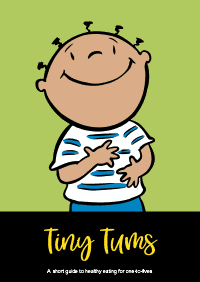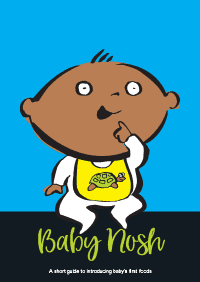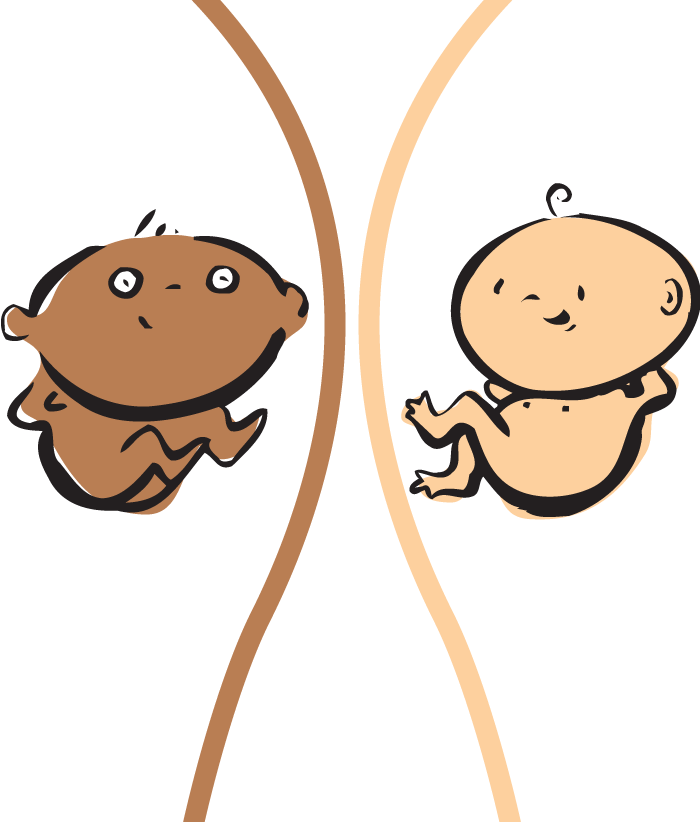
A short guide to eating well during pregnancy and breastfeeding
This little guide, based on current government advice, covers the basics about eating well during pregnancy. The best people to give you more detailed advice are your GP, midwife and dietitian.
A pregnant
pause for thought
Eating a well-balanced diet is important for health, whatever your age, but particularly if you are pregnant (or planning to have a baby in the near future). This is because your baby can reap the benefits of your healthy diet while he or she is growing in your womb.
The good news is that a healthy diet for pregnant women is similar to a healthy diet for everyone, there are just a few additional important things to keep in mind.
You might feel hungrier than usual, but you don’t need to “eat for two”. It’s only in the last 3 months of pregnancy that you need an extra 200 calories a day – that’s a large banana and a glass of semi-skimmed milk or a piece of fruit and 30g hard cheese.
It’s a great idea to have a good breakfast every day. If you struggle with nausea, you could try having a smoothie or something light or plain to help keep your energy levels up.
Healthy diet guide
A healthy diet contains a variety of foods from each of the groups in the table below.
POTATOES, BREAD, RICE, PASTA AND OTHER STARCHY CARBOHYDRATES
Examples
Bread, breakfast cereals, potatoes, rice, pasta, couscous, cornmeal, yams and sweet potatoes
Quantity
Make these a main part of every meal and eat wholegrain or high-fibre varieties when you can
FRUIT AND VEGETABLES
Examples
Oranges, apples, bananas, mangoes, carrots, peas and tomatoes
Quantity
Try to eat at least five servings a day
MILK AND DAIRY
Examples
Milk, hard cheese, yogurt, fromage frais
Quantity
Three servings per day will provide enough calcium and iodine to meet your requirements
BEANS, PULSES, FISH, EGGS, MEAT AND OTHER PROTEINS
Examples
Beef, lamb, pork, chicken, beans, lentils, nuts, eggs and fish
Quantity
Three servings per day will provide enough calcium and iodine to meet your requirements
OILS AND SPREADS
Examples
Olive oil, rapeseed oil, soya oil, butter and fat spreads
Quantity
Use sparingly
FOODS AND DRINKS HIGH IN FAT AND/OR SUGAR
Examples
Crisps, fizzy drinks, chocolate, sweets, cakes, pastries and biscuits
Quantity
If you’re having these foods, try to have them less often and in small amounts.
Keeping active
during pregnancy
It’s important to stay active during pregnancy – it’s good for you and your baby! Weight-bearing exercise (where your feet support your whole body weight) may help reduce labour time and other complications. It can also help:
- To keep your weight gain to a healthy pregnancy weight – your midwife will be able to advise what a healthy weight is for you.
- improve fitness, mood and sleep
- reduce risk of pregnancy problems such as high blood pressure and diabetes
Aim for at least 150 minutes of physical activity per week. Try to do a mixture of aerobic and muscle strengthening activity. Don’t overdo it – you should be able to hold a conversation without becoming breathless. If you take part in a class, let your instructor know that you are pregnant so they can suggest adaptions where necessary.
If you weren’t already active before you got pregnant, begin with no more than 15 minutes of continuous exercise, 3 times a week. You can then increase this gradually to daily 30-minute sessions.
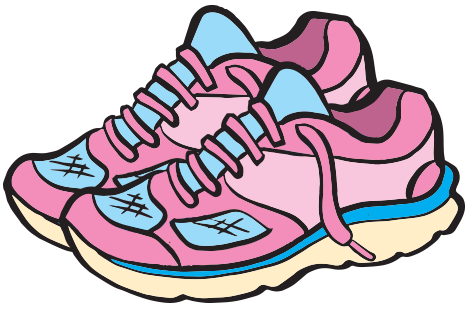
Here are some suggestions for useful resources on staying active during pregnancy:
www.tommys.org
www.activepregnancyfoundation.org/thismummoves
Mighty minerals
Iodine
Iodine supports normal cognitive function, as well as normal growth of the baby.
Milk and yogurt are good sources of iodine. Eggs and fish are also good sources.
To meet your iodine requirements have three portions of milk products each day and two servings of fish and some eggs each week.
Calcium
Calcium is needed for normal growth and development of children’s bones.
Having a glass of milk, a pot of yogurt and a small piece (about the size of two thumbs) of hard cheese a day will help provide most pregnant mums with enough calcium. Teenage mums need more calcium to meet their needs.
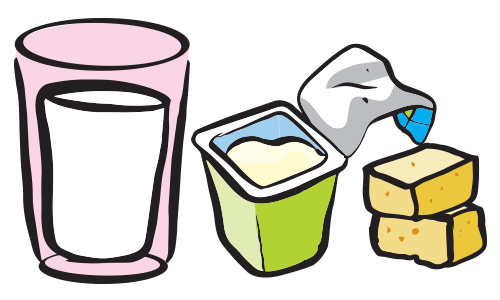
Other foods that can help towards calcium intake include white bread, some types of nuts and seeds, green leafy vegetables, some types of beans and peas and tinned fish with bones (like sardines and pilchards).
Iron
If your diet is lacking in iron, you may feel very tired and become anaemic.
A good source of iron is red meat e.g. beef and lamb. Try to eat lean versions or trim the fat off.
Alternatively, foods such as green leafy vegetables, breakfast cereals with added iron, beans, lentils and nuts also contain some iron. To make the most of iron, eat these foods with vitamin C-rich foods (e.g. kiwis, tomatoes) at the same meal, as vitamin C boosts iron uptake. Avoid drinking tea or coffee at mealtimes as they can reduce iron absorption.
Vital vitamins

Folic acid (Folate)
Take a 400μg (microgram) folic acid tablet once a day while trying for a baby, (ideally start three months before) and for the first 12 weeks of pregnancy. This will reduce the risk of neural tube defects (NTD) such as spina bifida. If you or your partner have a family history of NTD, you’re taking anti-epileptic medication or you have diabetes, speak to your GP as you will need a higher dose.
Also choose high folate foods (e.g. green leafy vegetables) or foods with added folic acid (e.g. some breakfast cereals) – check the label to see if folic acid has been added.
Vitamin D
Take a 10μg vitamin D supplement daily. These are available in pharmacies and from the Healthy Start Scheme – ask your midwife or GP for advice.
Being outdoors with some skin exposed in the spring and summer will top up your vitamin D levels. Most vitamin D comes from the action of summer sunlight on our skin but remember to cover up or protect your skin before your skin starts to turn red or burn. Oily fish contains vitamin D.
Oily fish provides the essential omega 3 fatty acids (EPA & DHA).
Eat one or two (but no more than two) portions a week. If you don’t eat fish consider taking a supplement that is suitable for pregnancy.
Food for thought
The yes/no guide to eating during pregnancy

Foods to avoid
Foods high in the retinol form of vitamin A
Liver, liver sausage, and pâté, fish liver oil supplements or any supplements containing retinol. High-dose multivitamin supplements.
Why?
May contain too much in the retinol form of vitamin A
Which could be harmful to your unborn baby.
Similar safe foods
Any other red meat
Supplements with the carotene form of vitamin A
Foods to avoid
All types of pâté
Soft cheese with blue veins
e.g. Danish blue, Roquefort, Gorgonzola
Mould-ripened cheese
e.g. Camembert, Brie, Chevre (unless cooked thoroughly)
Uncooked or undercooked ready meals
Why?
Risk of listeria
Listeria is a bug that can lead to miscarriage or severe illness in the newborn. Thankfully it is very rare.
Similar safe foods
Cold roast beef or ham
Cheese without blue veins
e.g. Cheddar, Double Gloucester, Cheshire, Red Leicester
Cheese without a mould rind
e.g. Mozzarella, cream cheese, cottage cheese, soft herb and garlic cheese, cheese spread triangles
Ready meals that are cooked thoroughly until they are piping hot
Foods to avoid
Undercooked poultry
Why
Risk of salmonella
These foods are best avoided when pregnant as salmonella is a common cause of food poisoning.
Similar safe foods
Well-cooked poultry
With no traces of pink or blood.
Foods to avoid
Raw and undercooked meat, game, poultry
Unpasteurised goat’s, sheep’s and cow’s milk or foods made out of them
e.g. unpasteurised soft goats cheese or products made with raw milk
Unwashed fruit and vegetables
Why?
Risk of toxoplasmosis.
Toxoplasmosis is caused by a bug that has been found in raw meat and cat faeces in cat litter and soil. This infection has been known to cause harm to the unborn baby. Thankfully it is very rare.
Similar safe foods
Well-cooked meat, game, poultry and cured meat.
If you plan to eat cured meat cold then freeze it for four days before eating; this kills most parasites. If you are concerned you may choose to avoid cold cured meat.
Pasteurised or UHT milk, yogurt
including bio-yogurt and cheeses
Washed fruit and vegetables that are free of soil
Foods to avoid
Raw shellfish
e.g. oysters
Why?
Risk of food poisoning
Similar safe foods
Cooked fish and well-cooked shellfish
Foods to avoid
Shark, swordfish and marlin
Why?
Contains higher levels of mercury
This can be harmful to an unborn baby’s nervous system.
Similar safe foods
Other cooked fish
Tuna (no more than 2 steaks or 4 medium-sized tins a week)
Foods to avoid
Raw fish sushi
(when the fish used to make it has not been frozen first – ask in restaurants)
Why?
May contain a small parasitic worm
These can make you ill.
Similar safe foods
Ready-made sushi that you can buy in supermarkets
(it is a requirement that the raw fish used to make it must have been frozen first)
Caffeine
Consuming large amounts of caffeine during pregnancy has been linked to some health problems such as miscarriage and low birth weight, so it’s best to limit how much you eat or drink.
Caffeine is found in some foods and drinks, such as coffee, tea, energy drinks, some fizzy drinks and chocolate. Caffeine is also added to some medications including cold and flu remedies. Try to limit your caffeine intake to no more than 200mg a day during pregnancy and breastfeeding.
To give you an idea:
Now that your
baby has arrived…

What is a healthy diet for a new mum?
With the birth to recover from, broken sleep, and a new baby to look after, you’ve got a lot on your plate, so it’s important to take care of yourself too.
You might want to make use of quick and convenient meals and snacks and consider meals that lend themselves to batch cooking so that you are not having to cook every day.
Quick snacks
- Fruit smoothies made with yogurt
- Scrambled eggs, greens, or peppers on toast
- Berries with natural yogurt
- Bagel with cream cheese

Batch cooking ideas
- Spaghetti bolognaise or chilli con carne
- Pasta bakes (e.g. mac n cheese, tuna & sweetcorn, salmon and broccoli, chicken and red pepper)
- Lentil or chickpea curry
- Fish or cottage pie
- Beef, fish or chicken stew or lamb hotpot
- Fishcakes
- Muffins or scones

It is recommended that everyone should consider taking a daily vitamin D supplement of 10μg. All babies under one should have 8.5-10μg vitamin D daily unless they take more than 500ml infant formula a day (as it already contains vitamin D and other nutrients).
What is a healthy diet for a breastfeeding mum?
Breastfeeding has long-term benefits for your baby, lasting right into adulthood. Any amount of breastmilk is beneficial, and the longer you breastfeed, the longer the protection lasts and the greater the benefits.
Exclusive breastfeeding is recommended for the first 6 months of your baby’s life. After that, giving your baby breastmilk alongside solid foods for as long as you and your baby want will help them grow and develop healthily.
Your diet while breastfeeding should look the same as a healthy, balanced diet for everyone. This will help ensure you get all the nutrients you and your baby need.
Breastfeeding will probably make you a bit hungrier than usual. Be guided by your appetite, and choose a variety of foods from the healthy diet guide
Calcium-rich snack ideas
- Bowl of calcium-fortified bran cereal and milk
- Berries with natural yogurt
- Sardines on toast
- Hard cheese and crackers
- Mini pasta bowl with cheese
- Toasted pitta bread with houmous
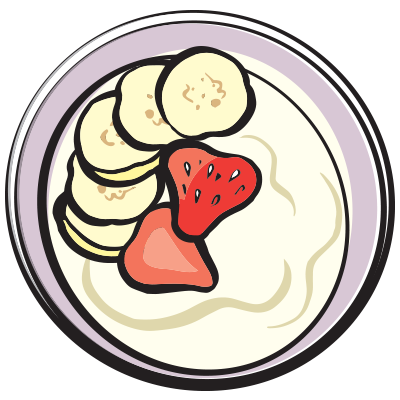
Extra nourishment
Calcium
Breastfeeding women need an extra 550mg calcium a day – that’s an increase of almost 80%. You will get this in a 250ml glass of milk and a 150g pot of yogurt (543mg calcium). See page 10 for more suggestions of calcium rich snacks.
Iodine
Iodine requirements increase by a third during pregnancy and breastfeeding. A higher amount is needed so that breastmilk contains enough iodine for your baby’s developing brain. Fish, milk, yogurt and eggs are good sources of iodine.
Protein
Protein requirements increase during breastfeeding – an additional 11g per day up to 6 months, and 8g per day beyond 6 months. Good sources of protein include beans, pulses, fish, eggs, meat, nuts, milk, cheese and yogurt.
Fluids
There are no specific guidelines for how much fluid to drink while breastfeeding, but it is important to drink plenty and stay hydrated. Water and milk are good choices, and you may like to keep a drink nearby when you settle down for a feed.
Benefits of breastfeeding
for mum and baby
- Breastmilk is perfect for your baby and adapts to meet their changing needs as they grow
- It helps protect baby from infections and diseases
- It is available whenever baby needs it
- It helps build a strong bond between mum and baby.
- infections, diarrhoea and vomiting – resulting in fewer hospital and GP visits
- sudden infant death syndrome (SIDS)
- breast and ovarian cancer
- cardiovascular disease
- obesity
Pregnancy and breastfeeding
your questions answered
Should I avoid peanuts?
There is no reason to avoid peanuts during pregnancy and breastfeeding unless you are allergic to them.
You may have heard in the past that some women chose not to eat peanuts. However, government advice changed because there was no clear evidence that eating peanuts while pregnant or breastfeeding affects your baby’s chances of developing a peanut allergy.
Should I avoid milk and dairy?
Mums-to-be should only avoid dairy if they have a medically diagnosed cow’s milk allergy. Breastfeeding mums should only avoid it if they or their baby have a diagnosed cow’s milk allergy.
It is important to get enough calcium in your diet, because along with vitamin D, it is needed for the growth and development of your baby’s bones. Milk, hard cheese and yogurt all provide calcium as well as other important nutrients including protein, potassium, iodine and many of the B vitamins. If you are breastfeeding you’ll need even more calcium than when you were pregnant, so make sure you have enough calcium-rich foods in your diet.
Is yogurt safe?
Yogurt is made from heat-treated milk. The bacteria that are added are a special ‘friendly’ type that are not harmful. So it’s safe and nutritious.
Should I avoid caffeine while breastfeeding?
Caffeine can be passed through your milk and may make your baby restless. Try to limit caffeine to less than 200mg a day, which is 2 mugs of tea and a plain chocolate bar, or 2 mugs of instant coffee. Try decaffeinated tea and coffee, or a glass of water or milk instead.
Can I drink herbal tea?
You can drink these in moderation; no more than four cups a day. And stick to those made with ingredients that are a normal part of the diet – for example mint or blackcurrant tea.
I think I’ve put on too much weight, should I go on a strict diet?
A healthy weight gain during pregnancy depends on your weight when you become pregnant. Don’t try to ‘diet’ while pregnant or breastfeeding as you and your baby need plenty of nutrients from healthy foods. Focus on having a variety of foods (see page 2) and ask you midwife for advice if you are gaining too much weight.
How can I stop feeling constipated?
Think fibre, fluid and activity. Eat plenty of high-fibre food such as wholemeal bread, high-fibre breakfast cereals, lentils, chickpeas, baked beans, fruit and vegetables and drink plenty of liquids. Keeping active is also important.
I’ve heard oily fish is good for me and my baby, but what is it and how much should I have?
We should eat at least one portion of oily fish a week. These include mackerel, pilchards, salmon, sardines, trout, fresh tuna and whitebait. Tinned tuna does not count as oily fish. If you are pregnant or breastfeeding only eat up to two portions of oily fish a week.
Can I drink alcohol?
Experts recommend avoiding alcohol during pregnancy or if you’re planning to become pregnant. It’s safest to not to drink alcohol at all to keep risks to your baby to a minimum.
An occasional drink is unlikely to harm your breastfed baby, but never share a bed or sofa with your baby if you have drunk any alcohol. Doing this has a strong association with sudden infant death syndrome.
Information sources [accessed 11/2025]
NHS Choices. Have a healthy diet in pregnancy
NHS Choices. Foods to avoid in pregnancy
NHS Choices. Vitamins, supplements and nutrition in pregnancy
BDA Food Fact Sheet. Pregnancy and diet
NHS Choices. Drinking alcohol while pregnant
Department of Health, Healthy Start
NHS Choices. Breastfeeding and diet

